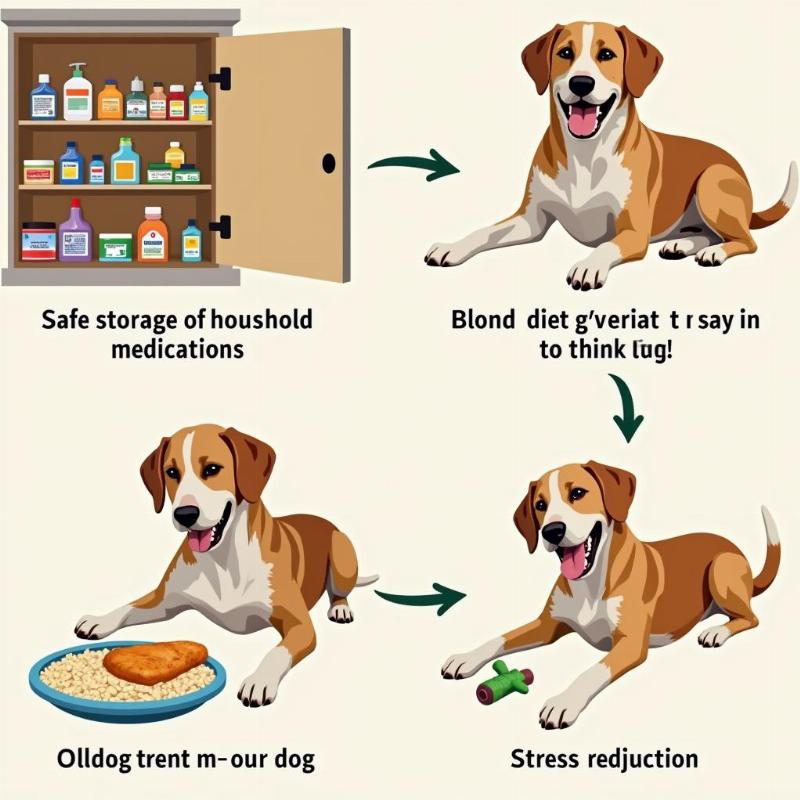Dog trembling and throwing up are alarming symptoms that can indicate a wide range of issues, from mild indigestion to serious medical conditions. Understanding the potential causes, treatments, and when to seek veterinary care is crucial for every dog owner in the US. If your dog is exhibiting these symptoms, this comprehensive guide will provide you with the information you need to navigate this worrying situation.
Understanding Why Your Dog is Trembling and Vomiting
Several factors can contribute to a dog trembling and throwing up. Identifying the underlying cause is essential for effective treatment. Some common causes include:
- Dietary Indiscretion: This is a common culprit, especially in curious puppies or dogs prone to scavenging. Eating spoiled food, garbage, or even certain plants can upset their stomach and lead to vomiting and trembling, often accompanied by diarrhea.
- Infections: Viral or bacterial infections, such as parvovirus or kennel cough, can cause both vomiting and trembling. Other symptoms may include fever, lethargy, and loss of appetite.
- Motion Sickness: Just like humans, some dogs are susceptible to motion sickness, particularly during car rides. This can manifest as trembling, drooling, and vomiting.
- Anxiety and Stress: Dogs can experience anxiety due to various factors like loud noises, changes in routine, or separation from their owners. Anxiety can sometimes lead to physical symptoms, including trembling and vomiting.
- Toxins: Ingesting poisonous substances, such as certain medications, cleaning products, or insecticides, can cause severe vomiting, trembling, and other neurological symptoms.
- Medical Conditions: Underlying medical conditions such as pancreatitis, kidney disease, liver disease, or even certain types of cancer can also cause these symptoms.
When is it an Emergency?
While some instances of trembling and vomiting may resolve on their own, others require immediate veterinary attention. Seek emergency care if your dog:
- Is also experiencing difficulty breathing, seizures, or loss of consciousness.
- Has ingested a known toxin.
- Is exhibiting signs of severe dehydration, such as dry gums and sunken eyes.
- Is vomiting blood or has blood in their stool.
- Is a puppy or senior dog.
Home Care and Treatment Options
If your dog’s symptoms appear mild and they are otherwise acting normally, you can try some home care measures before rushing to the vet. These include:
- Withholding food for a few hours: This allows the stomach to settle.
- Offering small amounts of water frequently: To prevent dehydration.
- Introducing a bland diet: Plain boiled chicken and rice can be easier to digest.
- Monitoring their symptoms closely: If the vomiting or trembling worsens, contact your veterinarian immediately.
Preventing Future Episodes
Preventing future episodes of trembling and vomiting involves addressing the underlying cause. This might include:
- Securely storing garbage and potentially toxic substances.
- Switching to a more digestible dog food.
- Using anti-nausea medication prescribed by your vet for motion sickness.
- Working with a veterinarian or a certified dog trainer to address anxiety-related issues.
- Ensuring your dog receives regular veterinary checkups to detect and manage any underlying medical conditions.
 Dog Trembling and Vomiting – Prevention Tips
Dog Trembling and Vomiting – Prevention Tips
Conclusion
Dog trembling and throwing up can be concerning, but understanding the potential causes and appropriate actions can help you navigate this situation effectively. Always consult with your veterinarian for an accurate diagnosis and tailored treatment plan, ensuring your furry friend receives the best possible care. Remember, prompt action and careful observation are key to a healthy and happy dog.
FAQ
- My dog is trembling but not throwing up. Should I be concerned? Trembling alone can also indicate various issues, including pain, cold, or anxiety. It’s best to consult your veterinarian.
- What can I give my dog for an upset stomach? Do not give human medications without veterinary guidance. Contact your vet for appropriate recommendations.
- How long should I wait before taking my dog to the vet if they are vomiting? If the vomiting is severe, persistent, or accompanied by other symptoms, seek immediate veterinary care.
- Can stress cause a dog to vomit? Yes, stress and anxiety can manifest as physical symptoms, including vomiting.
- How can I tell if my dog has ingested a toxin? Look for symptoms such as vomiting, diarrhea, lethargy, seizures, or difficulty breathing. If you suspect toxin ingestion, contact your veterinarian or the ASPCA Animal Poison Control Center immediately.
- What is the best way to prevent my dog from eating things they shouldn’t? Train your dog to “leave it” and ensure proper supervision, especially in areas with potential hazards.
- Is there a specific diet I should feed my dog if they have a sensitive stomach? Consult with your veterinarian for dietary recommendations tailored to your dog’s specific needs.
Connect with Beautdogs.us for Expert Advice
Beautdogs.us is your premier destination for comprehensive dog care information in the US. We offer expert advice on everything from breed-specific needs to the latest veterinary practices and product recommendations. Whether you’re a seasoned dog owner or just starting your journey, Beautdogs.us is here to support you and your furry friend every step of the way. Contact us for personalized support: Email: [email protected], Phone: +1 501-555-7529. Visit Beautdogs.us today!